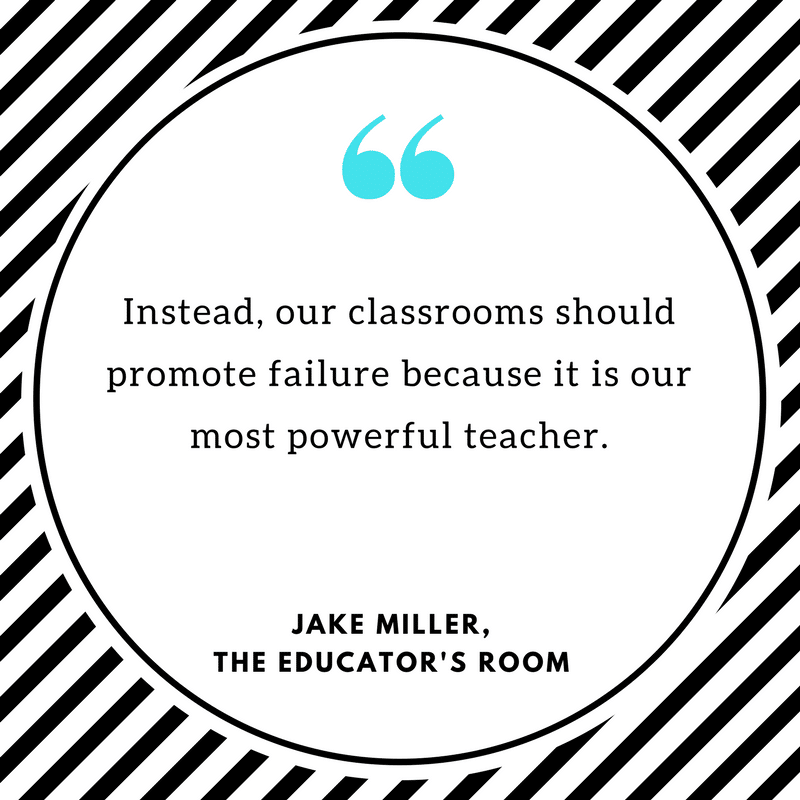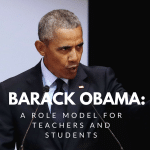We’d be hard pressed to find an innovation that has changed our modern living as much as the light bulb. When Thomas Edison and his employees experimented with methods to bring about an incandescent light, they finally arrived – almost by accident – on using a cardboard filament. After its success, he famously quipped “I have not failed; I’ve just found 1,000 ways that don’t work.”
For today’s youth, failing 1,000 times is not an option. Failing once is hardly acceptable itself.
[bctt tweet=”For today’s youth, failing 1,000 times is not an option. Failing once is hardly acceptable itself.” username=”@MrJakeMiller”]
Children have become increasingly protected from failure. Parents shield them from the emotional reverberations of failing. In fact, they’re many aren’t even permitted to leave their sight. Teachers are expected to find a way for all children to succeed (remember, fellow educators – “No Child Left Behind!”). And kids don’t fail. We fail them. Coaches are to praise before the point the finger. When the team succeeds, the coach is to share the wealth. When they fail, well, it’s all their fault. Or maybe the referee.
But what if the greatest referee in a kid’s life actually is failure? Zach Cutler of Entrepreneur.com wrote an article in 2014 called “Failure is the Seed of Growth.” In the article, Cutler argues multiple points:
- Failure creates extraordinary change
- Failure builds tough skin
- Failure keeps the ego in check
- Failure creates “aha” moments
- Failure propels growth as an entrepreneur
Seems like we need this more than ever. In a world bereft of labels of “snowflakes,” self-righteous and vain vagabonds, and followers, we could use a bit of failure.
And how deep is our fear of failure? In a Chapman University study, fear of “personal failure” ranked 5th highest, behind man-made disasters, technology, government, and environment and right before hurricanes, crime, and personal breakdowns.
[bctt tweet=”fear of personal failure ranked 5th, behind man-made disasters, technology, government, & environment and before hurricanes, crime, & personal issues” username=”@MrJakeMiller”]
But, just because adults have an aversion to failure, doesn’t mean we should pass that down like a bad set of genes to our children. Instead, our classrooms should promote failure because it is our most powerful teacher.
Humans tend to lean towards comfort zones, paths of least resistance, and protection of our frail personas. We hate being embarrassed, and nowhere is that more true than the classroom. Think of the shy kid in a classroom as the most evident example of that.
In his article for Edutopia, Bob Lenz, CEO of Envision Schools, quotes John Dewey, who believe that “failure is instructive. The person who really thinks learns quite as much from his failures as from his successes.” Dewey, in fact, built his entire constructivist belief of education on the notion that kids will try, fail, and try again. He later asks, “how do you make failure students’ friend?”
Is it a question educators have asked themselves lately? We need to. Teachers should stop sanitizing their classrooms of failure and really encouraging students to dream big and to be the next Thomas Edison.
[bctt tweet=”Teachers should stop sanitizing their classrooms of failure and really encouraging students to dream big and to be the next Thomas Edison” username=”@MrJakeMiller”]
Think about some of the innovations of the world that remain practically unchanged but have never been more ripe than ever:
- We still use pretty much the same combustible engine we’ve been using for the past 100 years
- These engines are powered by gasoline, which is becoming increasingly difficult to acquire
- Our world faces new problems like climate change, costs of health care, and perpetual poverty that need truly outside-the-box thinkers to tackle
If we think we’re going to get there doing what we’ve been doing, then we haven’t learned from Franklin, who thought the “definition of insanity is doing the same thing over and again and expecting the same results.”
So what can educators do to transform failure? Here’s just a small list of suggestions:
- Encourage students to raise their hands and get answers wrong. Randomly reward them for it.
- Provide a community where they discuss ideas in small groups without educators peeking over the shoulder, so they can evaluate problems (whether math, grammar, history, etc) that are in front of them.
- Ask them to examine the issues facing their local, state, national, and global community. Create a list. Brainstorm ways to solve the problems with the group.
- Hold a “Shark Tank” contest in the history, science, or English classroom. Go cross-curricular and rope in all three bits of standards.
- Ask the students to examine a piece of science fiction, either in literature, film, or television. Ask them “is some of this new world is feasible? Desirable? Why?”
- Have students examine new changes that are currently being discussed, toyed with, and implemented in government, technology, business, and in college science experiments. Ask the same questions from above.
- Provide time to act like entrepreneurs. Where’s there a market for the next Greek yogurt? IPhone? Cancer research? Computer software?
- Consider implementing a Google Friday (or less time) for students to explore some of these options themselves. Have them create a plan, work on it, and then share their findings with the class.
Who knows, maybe we’ll knock out a few hundred of the next Thomas Edison’s failures just in our class alone. That’ll help spur the next age of helpful robots, a better and more efficient government, cold fusion, a way to mitigate the impact of hurricanes and monsoons, or some other problem we didn’t even know we already had a solution to.
Besides, I love the “aha” moments. Don’t you?







